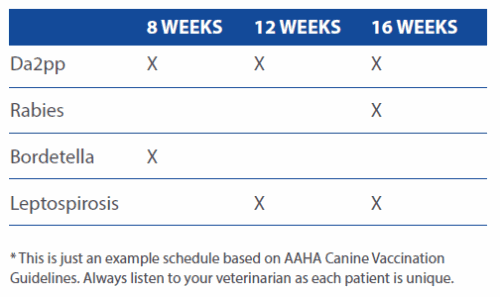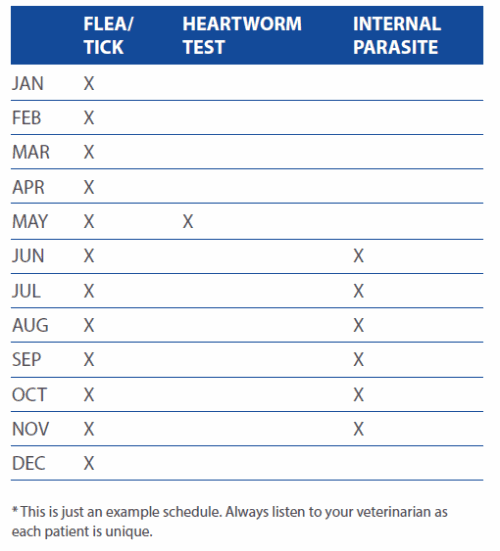Congratulations on your new puppy! As you take on this adventure of puppy ownership, it is important to set your puppy up for a long and healthy life. Below are the core aspects of preventative care that all puppies should have to promote their well being and longevity.
Vaccinations
Vaccinations allow the protection of puppies and dogs from preventable infectious diseases that can be potentially fatal.
Core Vaccines
Rabies – The rabies vaccine is required by law for all dogs in Ontario. The rabies virus causes a neurological disease that can be lethal to both animals and humans. There is no treatment for a rabies infection. The vaccination is given at 16 weeks of age, boosted in one year, and then every 3 years after.
Da2PP (Distemper, adenovirus-2, parainfluenza, parvovirus) – This combination vaccine protects puppies from four deadly viruses and is given to all dogs. This vaccination is given at 8 weeks, 12 weeks, and 16 weeks of age, then boosted in one year, and then every 3 years after.
Non-Core Vaccines
Bordetella bronchiseptica (kennel cough) – Bordetella can cause a hacking/honking cough in affected animals. It is very contagious and is spread through nasal secretions and close contact between dogs. Though it will often resolve without complications, it can progress to more serious respiratory disease such as pneumonia. Dogs that will be in close contact with other dogs such as in the dog park, at play dates, at the groomer or boarder, should be vaccinated. It can be given as early as 3-4 weeks of age and is boosted yearly after.
Leptospirosis – This is a bacterial disease that is transmitted to dogs through the urine of infected wild life. When an infected animal urinates, the bacteria is spread into the environment where it resides in bodies of water. Dogs who will be in close contact with water or wildlife, such as those who go swimming, to cottages, hiking or hunting, should be vaccinated for leptospirosis. This vaccine is given twice, 4 weeks apart, then boosted yearly after.
Side Effects
It is common for puppies to feel sleepy and have a decrease in their appetite after vaccinations. This should pass within a day. If your puppy has any vomiting, diarrhea, facial swelling or redness or changes to their breathing within 24 hours of the vaccine, you should seek emergency care immediately.
Example Vaccine Schedule*

Parasite Prevention
There are two major categories of parasites that we should protect puppies from: external parasites (fleas and ticks) and internal parasites (heartworm and intestinal parasites). The medications to prevent against these parasites is dosed on weight, so there should be scheduled monthly weigh-in appointments to monitor your puppy’s growth and to ensure we can send home the appropriate medications. The weigh in appointments should occur until your puppy reaches their full size.
External Parasite Prevention – Flea and Tick Medication
All dogs should be on year round preventative medication to protect them from fleas and ticks. This can be a topical or oral medication given every 1-3 months depending on the product. Ticks can be out in the environment in temperatures as low as 4 degrees celsius, therefore year round prevention is crucial.
Fleas – Small external parasites that live a majority of their life cycle in the environment, and infest animals to lay their eggs and reproduce. Not only can they cause irritation and itchiness of the skin, but they can also transmit intestinal tape worms to your pet which, can cause diarrhea.
Ticks – External parasites that can become engorged with blood and appear as a large smooth pimple. Ticks can transmit bacterial diseases such as Lyme disease, Ehrlichia and Anaplasma to your dog. These diseases can cause severe chronic systemic illness.
Internal Parasite Prevention – Heartworm and Intestinal Parasite Control
Most internal parasite medications protect dogs from intestinal parasites and heartworms. All dogs should be on this medication, either oral or topical, from at least June to November as that is when mosquitos are most active and there is the highest risk of contracting heartworm disease.
Intestinal parasites (round worms, hook worms, tape worms, whip worms) – Affected puppies typically show symptoms of soft stool, bloody stool, vomiting or diarrhea. It is recommended that your puppy is dewormed every 2 weeks until they are 12 weeks old, then monthly after that until 6 months of age. A stool sample evaluation should be performed at 12-16 weeks of age to screen for any parasites or parasite eggs.
Heartworm disease – This lethal parasite is spread through mosquito bites, and resides in the main blood vessels in the heart and lungs. The life cycle of this parasite is 7-9 months. This is why it is recommended that a heart worm blood test is performed at 8-9 months of age then once yearly to screen for presence of this disease. Your dog should be on a preventative medication throughout heart worm season (June to November) or year round if your pet travels to warm climates with you during the winter.
Example Parasite Prevention Schedule*

Diet Recommendations
The pet food store can be a daunting place. There are so many options, and of course you want to choose what is best for your puppy! The unfortunate reality is that pet foods are not well regulated, so many companies use marketing to persuade owners into diets that may not be best for their pet. Here are some helpful guidelines when selecting a diet:
Avoid raw – There are no peer-reviewed published articles that prove that raw diets are superior to traditional kibble diets. Most evidence shows that raw diets should be avoided as they are usually not nutritionally balanced and pose a high risk of bacterial contamination to the dog and all people who interact with it. Dogs fed raw diets should not be allowed to interact with any young, elderly, or immunocompromised people for that reason. A puppy fed a raw diet is at a high risk of being nutritionally deficient which, can greatly impair their growth and longevity.
Make sure the diet has grain – Grain-free diets have been linked to the development of heart disease in dogs who would normally not be predisposed to it. Though research still needs to be done to determine if it is the lack of grain in the diet or the legumes and additives that are added to replace the grain that increases this risk, the diets should be avoided.
AAFCO Standards – The American Association of Feed Control Officers (AAFCO) publishes nutritional guidelines for pets. If a diet is meeting the AAFCO standards by clinical trials, it means that the food brand is testing not only that the diets themselves meet the nutritional requirements of dogs, but that the dogs eating them are able to digest and absorb the nutrients and not be deficient. If you choose to transition your puppy onto a new diet, it is important to do so gradually over the course of a week to ensure you avoid gastrointestinal upset.
Some Recommended Puppy Diets:
- Hills Puppy Advantage
- Royal Canin Development Puppy
- Purina Pro Plan Puppy
Whenever considering a new diet, it is best to consult your veterinarian.
Helpful Links
American Animal Hospital Association Canine Vaccine Guidelines – https://www.aaha.org/aaha-guidelines/vaccinationcanine-configuration/vaccination-canine/
CAPC Vet Flea Guidelines – https://capcvet.org/guidelines/fleas/
CAPC Vet Tick Guidelines – https://capcvet.org/guidelines/ticks/
American Heartworm Society – https://www.heartwormsociety.org/pet-owner-resources/heartworm-basics
AVMA Raw Pet Food Policy – https://www.avma.org/raw-pet-foods-and-avmaspolicy-faq
ASPCA Article on Grain Free Diets – https://www.aspca.org/news/grain-free-petfoodhelpful-or-harmful-diet
Blog post written by: Dr. Biana Ferlisi